I’m writing these brief notes on a German electric train, winding alongside the mighty Rhine between Cologne and Stuttgart. Whaler-in-Chief Michael Ackermann, our travelling companion, informs me that the cliff opposite is Wagner’s Loreleifelsen; brilliant Autumn sunshine illumines the still-green vineyards, but the trees are turning, red, orange, gold. Nonetheless the thoughts in this particular cranium still revolve around the events three evenings previously, when Procol Harum played their third successive choral/orchestral concert in London.
On my knee, the notebook from the London Palladium, containing scribbled observations about the recent Procol concert. Linda and I had been allotted last-minute ‘house seats’ (we were there as merchandise personnel, but had been stood down because an outside company is contracted to handle all such selling at the Palladium … their commission being so high that the Procols could have sold CDs only at a loss) and we’re up in a box, our view of the audience arguably better than our view of the stage. These are the seats whose occupants were scathingly invited by John Lennon to ‘rattle their jewellery’ rather than clapping. A memory-stick on a lanyard is the closest I get to personal adornment, but it got rattled almost to pieces.
The notebook’s nyctographic scribblings are all-but illegible, three days later. I also find that there are whopping gaps, songs about which I wrote next to nothing, having been transfixed or transported by what we were hearing, and also by the intensity with which the audience – so visible from our ostentations eyrie – were absorbed in the music.
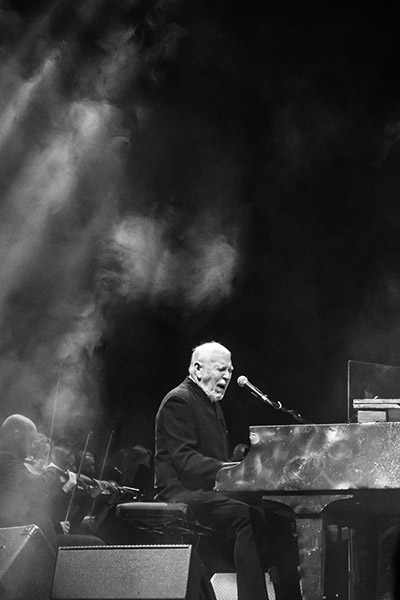 Concert proceedings started
with a scripted introduction, expertly delivered by tour-manager Howard Colinese,
pretty closely based on text solicited from me a few days earlier. No
doubt when audience recordings begin to circulate, their owners can write in and
advise of any inaccuracies in this remembered account:
Concert proceedings started
with a scripted introduction, expertly delivered by tour-manager Howard Colinese,
pretty closely based on text solicited from me a few days earlier. No
doubt when audience recordings begin to circulate, their owners can write in and
advise of any inaccuracies in this remembered account:
“Good evening ladies and gentlemen, and welcome to the London Palladium for tonight’s celebration of the first-ever concert to feature a symphony orchestra, a chamber choir, and a world-class rock band (applause).
“That magic collaboration was recorded live, 47 years ago in Edmonton, Canada … where they’re still talking about it. In fact people all over the world are still talking about it … and that’s why we’re here tonight, to hear the whole concert played again, and much more besides.
“Already on the stage, ladies and gentlemen, please welcome The Senbla Orchestra (applause). Behind them, the English Chamber Choir (applause). Next up, holding the reins, our Musical Director for tonight, David Firman (applause).
“And finally … ‘may I introduce to you the act you’ve known for all these fifty-one years’ … Procol Harum, led by Gary Brooker.” (applause)
Conquistador
The band came out, all in black, The Commander suited, his colleagues more casual. The orchestra, which had been pretty muted in rehearsal both on the South Bank on the Monday evening and in situ at the Palladium during the afternoon of the concert, were now playing at full throttle, the brass in particular giving it some ‘extreme Wellington’ in Geoff Whitehorn’s striking phrase. Geoff Dunn’s drums were outstanding from the outset; the mix in our remote seats didn’t initially offer much guitar or piano, but Bunny Warren, at the controls, was constantly tweaking and improving things. Gary resisted any temptation to play up the ‘Edmonton revisited’ aspect of this recital. He didn’t start by saying ‘After you!’ to conductor David Firman, nor did he proclaim ‘It’s a Hoffnung’ … though, as it turned out, there were one or two Hoffnungesque moments, and certainly the inter-song patter often reached Hoffnungian heights of eccentric humour.
Gary had contracted a nasty cold, and had been medicating his voice and resting it to such an extent that merely a few lines had been sung in many hours of orchestral rehearsal. It was a great relief, therefore, to hear Conquistador delivered with real verve, though his vocal timbre did betray traces of infection … these became less apparent, I think, as the concert progressed.
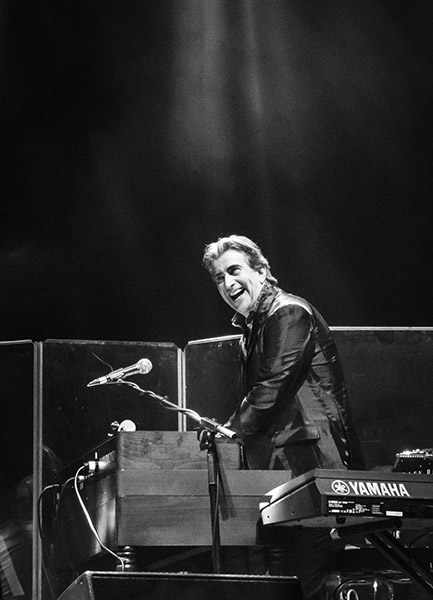 All
This and More
All
This and More
Gary observed that Procol had ‘…finally made it …’ to the UK’s most famous theatre, adding that he thought they’d played the Palladium in the Seventies, but had forgotten it (they played a huge promotional concert for Procol’s Ninth there in August 1975). All This and More was a lovely second offering, the band reinforced particularly by the ’celli and basses (parts the original producer declined to include on the original Salty Dog album); a new departure was Geoff’s Whitehorn’s addition of the Dave Ball guitar counterpoint in the verses, played with a bit more twang, but every bit as effectively. The choir came across strongly at the end of this song and it was clear that this was going to be a strong combination of musical ingredients. The ensemble even succeeded, by dint of obvious concentration, watching, and counting, in finishing together following the long play-out.
Luskus Delph
Luskus Delph … ‘a little ditty about love, I think’ according to GB, wafted along delicately and gently, with those occasional syncopated stings that give it rhythmical distinction. It’s scored for brass and strings only, and this light orchestral texture permitted a first real glimpse of Josh Phillips’s enhanced Hammond: the XK5 upper manual, with its huge warm sound and authentic key-click, really seems to have all the haunting presence of the analogue original. A final flurry of brass wound up this charming song … one wonders why it was relegated to a B-side only.
Shine on Brightly
Shine on Brightly
didn’t sound like the strongest Brooker arrangement at the Hollywood Bowl, nor
is the existing Edmonton out-take a sparkling listen. But live … it’s fantastic.
From the very first rehearsal with The Senbla Orchestra, the night before, it
had sounded strongly integrated and rhythmically exciting. Woodwinds played an
important part in the verses, and Geoff Dunn offered up some tremendous
cross-rhythmic work in the third verse, much in the style of his illustrious
predecessor.
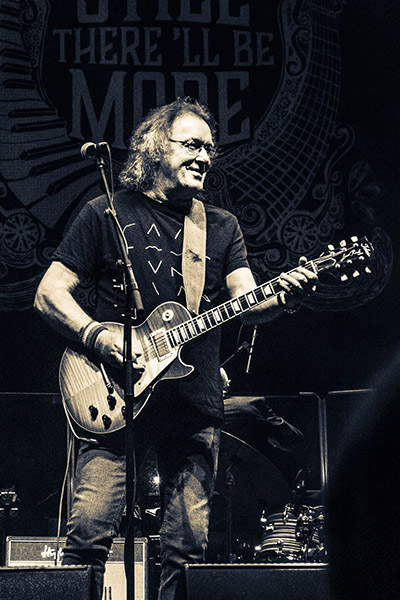 At the end of the song Gary reached for his drinks tray, gargled, coughed, and
took a Ricola. He noticed a rank of empty seats in the front row. ‘Anybody here
from Eagle [the band’s record company]?’ ‘Yes,’ came a lone voice from the
crowd. ‘Liar!’ he retorted. Yet needless to say those seats were all full
directly after the interval … and I don’t think it was because the Eagle
personnel had flown in late.
At the end of the song Gary reached for his drinks tray, gargled, coughed, and
took a Ricola. He noticed a rank of empty seats in the front row. ‘Anybody here
from Eagle [the band’s record company]?’ ‘Yes,’ came a lone voice from the
crowd. ‘Liar!’ he retorted. Yet needless to say those seats were all full
directly after the interval … and I don’t think it was because the Eagle
personnel had flown in late.
A Salty Dog
This song was dedicated to
‘all our departed friends’ – and it started with a spooky Wagnerian prelude,
drums, bassoons, other winds; its repeated segment of Brooker melody,
corresponding to ‘no one left alive’, sounded strangely redolent of ‘Happy
Birthday to You’. This was an excellent performance, though Gary’s vocal
indisposition meant he did not tackle the signature up-slide into the title
phrase. A standing ovation ensued nonetheless.
Acknowledging the choir, who/which had of course been singing in Latin, Gary observed
that laughter was the same in English as in Latin. ‘I found that out on my
audience with the Pope,’ he told the audience, going on to clarify that he
didn’t mean the Pope in Rome, but the poet, Alexander Pope, who died sometime in
the 1740s.
In Held 'Twas in I
Announcing In Held, with a little mock trepidation, Gary proclaimed that Procol Harum ‘don’t go rusty … we’re made of stainless steel’. He also confided that he had ‘never heard of Prog Rock’ until he received his recent award for a notable contribution to that movement.
The opening oration continued his practice of characterising the Dalai Lama with a cod-Indian accent (perhaps not quite PC, though it certainly contributes to clear story-telling). The cor Anglais made a nice contribution to the ensuing instrumental passage, accompanied by discreet twangling from Geoff Whitehorn; then Matt Pegg delivered the ‘one whom I am with no more’ speech, its soulful impact made more intense in the minds of all those aware of One-Eye’s empty seat in Row E. Then the tubular bells cut in, reinforced by piano, for the Tchaikovsky-flavoured Ominous Chimes.
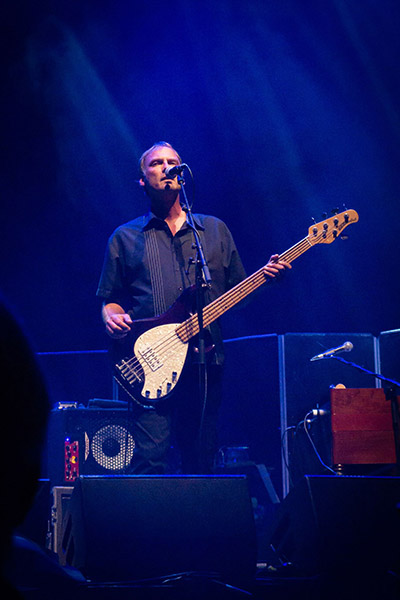 ’Twas Teatime …
was, as usual, a dramatic
contrast, full of Neighbour-like mischief, the audience helping out with
gasps and whoops, and the orchestral party-whistle cutting through everything
else. One missed the tuba from the Edmonton recording, but the young
orchestra – not a regular ensemble but one culled from available London Pros –
was in all other respects easily the equal of the 1971’s ESO (which, at the time
of the famous Procol recording, had been professional only a few months).
’Twas Teatime …
was, as usual, a dramatic
contrast, full of Neighbour-like mischief, the audience helping out with
gasps and whoops, and the orchestral party-whistle cutting through everything
else. One missed the tuba from the Edmonton recording, but the young
orchestra – not a regular ensemble but one culled from available London Pros –
was in all other respects easily the equal of the 1971’s ESO (which, at the time
of the famous Procol recording, had been professional only a few months).
Following a chandelier-rattling storm, In the Autumn was relatively easy on The Commander’s voice, which was still causing him discomfort. The orchestral work richly complemented Fisher’s inspired harmonic structures, and the enhanced Hammond lent an edgy, piercing tone to the rising, serpentine solo. The build-up of sonic chaos was tremendous, and brought out the audience air-drummers in force, conspicuous among them a Danish gentleman in the fifth row or so, who was evidently transported to another world of disinhibition by the whole performance.
The next movement, whose high ‘soul’ climax presents one of the toughest peaks in the Brooker songbook, was always going to be tricky with a throat infection. Gary nailed #2 and #3 absolutely! The way the orchestra drops out for this number, letting the piano and vocal (and later the Montage harpsichord) speak so simply, is brilliant; and when they pile back in for the instrumental break one feels it must be the climax of the entire suite.
But no, Grand Finale
is the climax! It was taken at a brisk clip, all the intricate piano work intact
and clearly audible, as were the sonorous choiring and the heavy, heavy waltz in
the middle where the Whitehorn solo stirs everything up. This was a
memorable performance of the suite, which we heard rather filleted at the Royal
Festival Hall last year, and with a less incisive orchestra.
And so to the interval. Edmonton fans knew that Whaling Stories
was being kept in reserve but, excepting Repent Walpurgis, which had not
been orchestrated by Gary but by producer Chris Thomas, and Simple Sister,
we’d heard everything the Jubilee Auditorium heard in 1971 … and it had been
good.
Business Man
After the interval Procol turned an emphatic page. Business Man, from last year’s Novum album, was played band-only; Geoff’s stirring guitar break earned cheers, and Matt’s busy bass line was as ever amazingly precise and dextrous. ‘Repertoire …’ Gary told the audience. ‘I know it’s a French word, but of course we used to own France.’ A digression about Richard Coeur de Lion followed, and then we learnt that ‘Mr Bean’ had been a fan of Procol ever since he’d been at Cambridge. This was odd … Rowan Atkinson went to Oxford where, I’m told, there is also a university, somewhat in the Cambridge league.
Holding On
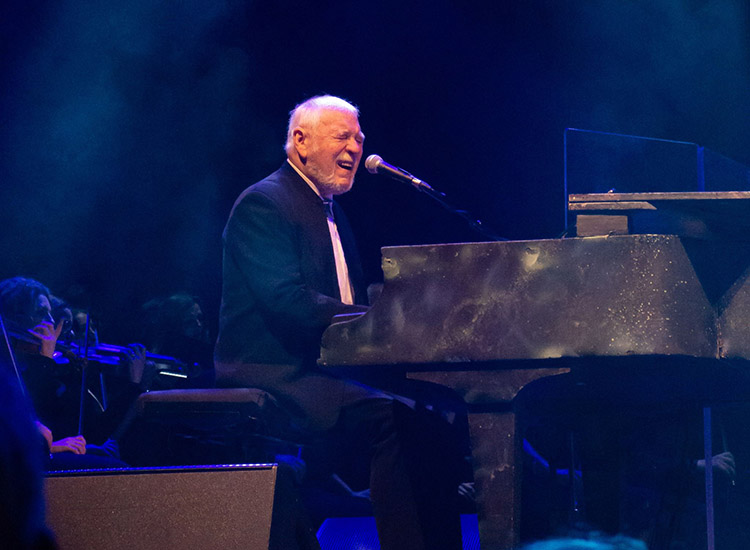 Next
up, Holding On took us back to the magnificent 1996 Barbican concert when
it was, of course, quite a new song. It works very well with orchestra, though
the opening entry has proved challenging to several choirs. Geoff had now moved
to his Les Paul-style guitar, and indeed his purple, violet or mauve London
Palladium Procol tee-shirt, another winning design from Julia ‘Novum’
Brown. Gary lightly remixed the words in verse two but the emotions came through
clear and strong, and there was wide and welcome dynamic variety throughout the
song. At the end GB namechecked Maestro David Firman, ‘the most-appreciated man
on the Palladium stage’. Some might not agree, but surely all would concur that
he’s absolutely indispensable, having left his fine mark on over half Procol’s
forty orchestral shows since their symphonic début in 1969.
Next
up, Holding On took us back to the magnificent 1996 Barbican concert when
it was, of course, quite a new song. It works very well with orchestra, though
the opening entry has proved challenging to several choirs. Geoff had now moved
to his Les Paul-style guitar, and indeed his purple, violet or mauve London
Palladium Procol tee-shirt, another winning design from Julia ‘Novum’
Brown. Gary lightly remixed the words in verse two but the emotions came through
clear and strong, and there was wide and welcome dynamic variety throughout the
song. At the end GB namechecked Maestro David Firman, ‘the most-appreciated man
on the Palladium stage’. Some might not agree, but surely all would concur that
he’s absolutely indispensable, having left his fine mark on over half Procol’s
forty orchestral shows since their symphonic début in 1969.
Into the Flood
Into the Flood was one song about which I wrote nothing. At the afternoon’s rehearsals it had sounded wonderful, albeit without the lead vocal, and I’d been marvelling at its sheer oddness: the beaty verses riding over a bassline originating with the inventive Matt Noble; the call-and-response vocal writing; the burst of (supposedly!) Mozart; the knuckle-wearying hoedown by Matthias Weiss; and the wry snippet of Beethoven. Somehow, with the lead vocal in place, it all ties together: a song with really good Reid words (so good, they can also be found on a Trower album and, in part, on Tabaluga and the Magic Jadestone) … a song that scarcely got released at all following the New York sessions that spawned it … and that we never hear in band-only version.
Within Our House
The next song has never been heard in band-only version either, since Procol Harum had not played it live before (though Gary made little of this … his introduction had focused more on pizza, and the fact that he is ‘more of a potato man myself', plus a tiny hint of Grand Hotel, which had vanished from the setlist during the preceding week, plus a confession that … denied proper rehearsal because of his throat infection … he was ‘going to have to make this up tonight.’ Written for church performance, and thereafter played only in consecrated premises, and by the Gary Brooker Ensemble, it still sounds like a church piece in the Palladium yet, though not short, it doesn’t feel out of place in a Procol recital already featuring such variety.
The Brooker tonsils were well warmed up by now, of course, and he was able to place all the tough notes in this see-sawing melody, making rare use of his falsetto in places. Similarly the minefield of chords in special inversions seemed to present no problem. The piano is very exposed until the bass, drums, and acoustic-flavoured guitar come in, but Josh supplied a continuo organ part on the Montage, to which he often turns for churchy pre-sets. The plucked orchestral strings imparted a nicely baroque flavour, and the brass and winds got a well-deserved break.
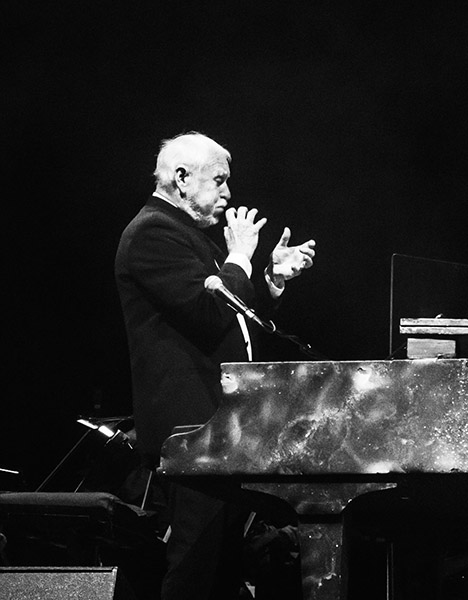 The large choir dealt
subtly with a piece written for chamber resources, and the featured soloists –
soprano Rosalind Scott-Douglas, alto Karen Bloomfield, tenor Mark Roper, bass
Ken Wharfe – made a lovely job of the extended quartet in the middle. The piece
is long, but so was the applause; and at the after-party several fans mentioned
it as a highlight of the show. Kudos to Procol and Gary, I say, for taking on
such a demanding piece under such pressure.
The large choir dealt
subtly with a piece written for chamber resources, and the featured soloists –
soprano Rosalind Scott-Douglas, alto Karen Bloomfield, tenor Mark Roper, bass
Ken Wharfe – made a lovely job of the extended quartet in the middle. The piece
is long, but so was the applause; and at the after-party several fans mentioned
it as a highlight of the show. Kudos to Procol and Gary, I say, for taking on
such a demanding piece under such pressure.
Pandora's Box
Gary thanked the posse of singers, whose collective name – The English Chamber Choir – he seemed to find some difficulty in remembering. ‘You should hear the Welsh Chamber Choir …’ began one surreal spin-off, and we also had the start of an impromptu blues, ‘Woke up this morning / both the cars were gone’. But then we were back on familiar territory for Pandora’s Box, with the band in headstrong form … Gary playing air trumpet in the wind solo, Matt offering to play the bass with his teeth, and rather faint marimba from the well-stocked percussion department. But although this had gone very well in both orchestral rehearsals the ensemble took different routes at the very end: Josh’s hand-signal, towards the climax of his Hammond break, precipitated an early wind-up from the Procols, who held a faintly apologetic chord while David Firman’s charges negotiated the last eight bars of their immutable score. It all sounded fine, exciting in fact, but it wasn’t quite what had been expected.
Symphathy for the Hard of Hearing
Another mighty piece followed which, like Into the Flood, is heard only on symphonic occasions: Symphathy for the Hard of Hearing, inspired by WWII tales from Gary’s late neighbour Sid. The slow sections of this always strike me as very moving (not least the ‘Lest we forget the sacrifice …’) but the evocation of war is less easy to follow, and makes its effect more by noise and tumult than by vocal intelligibility. No such trouble hearing the tiny piccolo, though! Ditto the spectacular, harmonic-infested cadenza from Maestro Whitehorn. Good to report that tapping is so unobtrusively yet effectively integrated into the Procol sound.
Neighbour
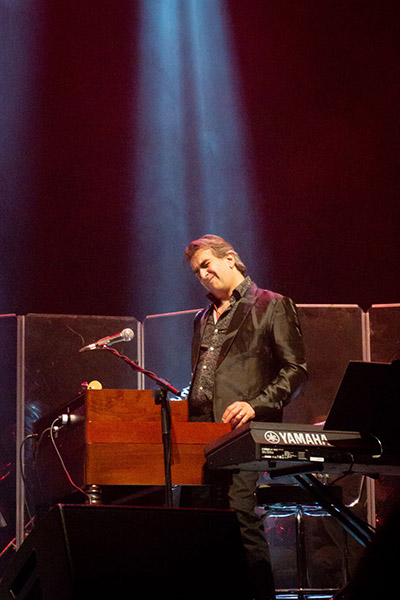 Another
orchestra-free piece
followed ‘from our first album since 1066’ … Neighbour, with the
answering phrases coming from the choir in a style comically at odds with the rumbustious band parts, and therefore slightly evocative of the Stones’ You
Can’t Always Get what you Want. It’s good to see this piece of fun
established in the concert repertoire, and it stands up very well on its own,
without the three-ukulele treatment that preceded Gary’s fall at the Royal
Festival Hall. No such calamity was reported on his occasion, thank goodness.
Another
orchestra-free piece
followed ‘from our first album since 1066’ … Neighbour, with the
answering phrases coming from the choir in a style comically at odds with the rumbustious band parts, and therefore slightly evocative of the Stones’ You
Can’t Always Get what you Want. It’s good to see this piece of fun
established in the concert repertoire, and it stands up very well on its own,
without the three-ukulele treatment that preceded Gary’s fall at the Royal
Festival Hall. No such calamity was reported on his occasion, thank goodness.
Sunday Morning
Introducing the next piece, Gary said ‘if you don’t like this next song, you should go home at the end’. It was, he added, about ‘that big building that nobody knows what it’s for’ … ie the church … and it did seem in some ways a companion piece to Within Our House in terms of its calm, elegiac sound-world. The remarkable feature of this, apart from its melodic beauty and the vocal performance it elicits, is the way the rock instruments sidle in imperceptibly, taking it from a whisper to a roar with the gentlest imaginable gradient.
Whaling Stories
‘You OK?’ asked Gary. ‘You’re all older than me … ’. He then represented that Whaling Stories had been omitted from the first half by mistake, though the printed setlists, both today and yesterday, told another story. But this epic piece (‘a little adventure on the rough seas of Cape Horn’) made an excellent climax to the second half, whereas it would have been fighting with Grand Finale had it been included among all the Edmonton material earlier on. It was a titanic performance, as good as these things get; but my notes were carelessly overwritten and I can’t now decode what I wrote either on top or underneath. They end with ‘little bits of paper with fly-shit all over it,’ which I think was GB’s comment on the orchestra reading the dots.
A Whiter Shade of Pale
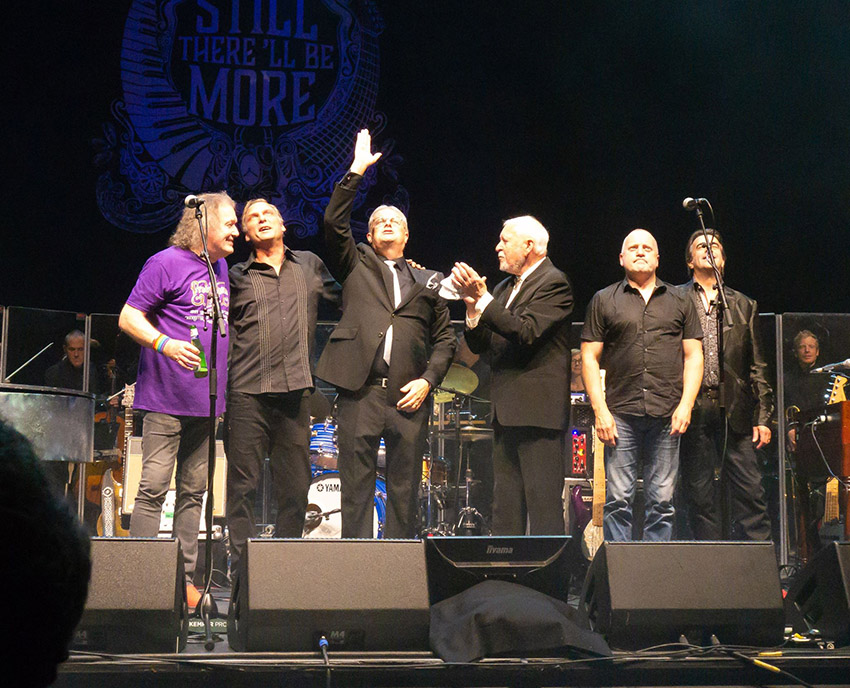 GB
noted the time (the concert had already overrun by about 25 minutes, largely
thanks to his penchant for patter) and said he wanted to be able to get out of
here ‘before my senior railcard runs out’. He also observed that he had, so far,
escaped uninjured. Following a very touching tribute to Allen ‘One-Eye' Edelist
(‘a good man and a good Procol fan … once you get in , you never get out’)
whose ninety-ninth concert this would have been, he left the orchestra to play
the Darryl Way minor-key Whiter Shade prelude, which worked beautifully.
David Firman paid close attention to Gary Brooker as he made his vocal entry;
then the Hammond came through strong and nasal; the vocal was excellent, as was
the dancing of a delightfully abandoned, dark-haired fan in the third or fourth
row, hard stage left.
GB
noted the time (the concert had already overrun by about 25 minutes, largely
thanks to his penchant for patter) and said he wanted to be able to get out of
here ‘before my senior railcard runs out’. He also observed that he had, so far,
escaped uninjured. Following a very touching tribute to Allen ‘One-Eye' Edelist
(‘a good man and a good Procol fan … once you get in , you never get out’)
whose ninety-ninth concert this would have been, he left the orchestra to play
the Darryl Way minor-key Whiter Shade prelude, which worked beautifully.
David Firman paid close attention to Gary Brooker as he made his vocal entry;
then the Hammond came through strong and nasal; the vocal was excellent, as was
the dancing of a delightfully abandoned, dark-haired fan in the third or fourth
row, hard stage left.
Conquistador
The ensuing standing ovation led into a reprise of Conquistador (as at Edmonton) but this time in the 1995 arrangement by Nicholas Dodd, as heard on The Long Goodbye, the symphonic music of Procol Harum album. The band stood down until the midway point in each verse, GB standing throughout, playing no piano, singing from the front, sometimes in a Spanish accent, sometimes brandishing a white fabric shroud, to no immediately-discernible purpose. David Firman joined the band for the final bow, as the photograph shows.
All in all, it was a marvellous concert, and although our seats were oddly sited, it was a most interesting experience to see, face-on, the joyous acclaim that the band enjoyed. Before long the musicians met their guests and the lucky fans who’d come through the BtP lottery (which raised more than 1,000 USD for Pat Edelist and family). George Lovell circulated, dispensing copies of his memoir for the band; families convived; fans had their photos taken with their idols; CDs of the new Edmonton remastering were duly signed, and everyone appeared to be in an excellent humour.
Later, on Facebook, one read plaints from fans who ‘couldn’t get a place’ at this aftershow party. It’s too late for this advice to be much use, of course … but perhaps it’s worth saying (in case there should be a next time): nobody who didn’t apply got a place. The only people who got places were those who applied for them. ‘Beyond the Pale’ is very grateful, on fans’ behalves, to Gary and Chris Cooke for a generous quota of passes. And as a top-flight sideman observed to a fan not long ago, the thoughtful, understanding and respectful relationship between Procol Harum and followers is a unique one. Long may it prosper!
Procol dates in 2018 |
Booking |
Another review of the same show
|
PH on stage | PH on record | PH in print | BtP features | What's new | Interact with BtP | For sale | Site search | Home |